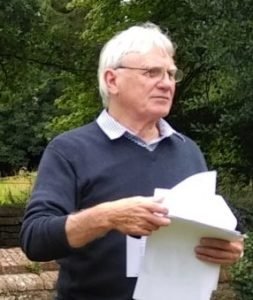 Michael Credland developed an interest in WW1 from a very early age and, over the years, has built up a formidable collection of artefacts and memorabilia, some of which he had brought along today. He is also a well-respected authority on the role of the Lincolnshire Regiment in the Great War and on war memorials and, has presented his research and expertise in various publications.
Michael Credland developed an interest in WW1 from a very early age and, over the years, has built up a formidable collection of artefacts and memorabilia, some of which he had brought along today. He is also a well-respected authority on the role of the Lincolnshire Regiment in the Great War and on war memorials and, has presented his research and expertise in various publications.
For more than 150 years, British soldiers marched into battle adorned in red coats, white cross belts and gleaming buttons and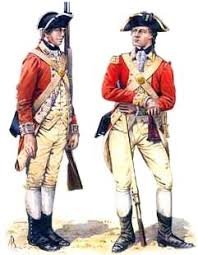 literally ‘stuck out like a sore thumb’ however, by the time of The Boer War, keeping out of sight of the long-range rifles necessitated the army trading in its iconic crimson tunics for the much less conspicuous khaki battledress. Between the end of the Boer War and the start of WW1, yet another makeover took place and Mike had three different examples of this ‘new’ uniform on display.
literally ‘stuck out like a sore thumb’ however, by the time of The Boer War, keeping out of sight of the long-range rifles necessitated the army trading in its iconic crimson tunics for the much less conspicuous khaki battledress. Between the end of the Boer War and the start of WW1, yet another makeover took place and Mike had three different examples of this ‘new’ uniform on display.
It was now made in hardwearing serge, a thick, woollen material died khaki green for camouflage purposes. It had two breast pockets for personal items, two smaller pockets and an internal pocket; rank was sewn onto the upper tunic sleeve. 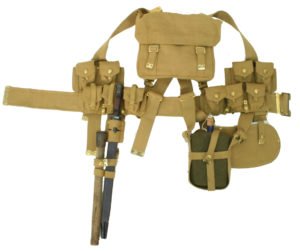 Every soldier carried his load in Patent Webbing which did not quickly deteriorate on the battlefield like leather; it comprised of a wide belt, ammunition pouches (which held 75 rounds each), and a haversack which provided a hands-free means of carrying essential personal items including cutlery, mess tins, clasp knife, razor, can opener and a variety of brushes.
Every soldier carried his load in Patent Webbing which did not quickly deteriorate on the battlefield like leather; it comprised of a wide belt, ammunition pouches (which held 75 rounds each), and a haversack which provided a hands-free means of carrying essential personal items including cutlery, mess tins, clasp knife, razor, can opener and a variety of brushes.
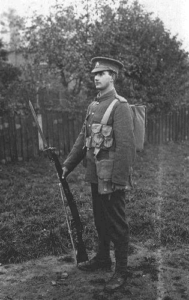 British riflemen were renowned for their accuracy; this was put down to the fact that many of them came from farming stock so they were already proficient at shooting. Every soldier was trained to fire a minimum of fifteen rounds per minute using a .303inch calibre Short Magazine Lee-Enfield rifle which had a magazine of 10 rounds. Not only was this rifle very effective in the trenches, it was also far superior to anything used by other countries and, for close quarter fighting, a 17inch Wilkinson Sword bayonet was attached to the end of the rifle; although this did not prevent the rifle from being fired, it did reduce its accuracy.
British riflemen were renowned for their accuracy; this was put down to the fact that many of them came from farming stock so they were already proficient at shooting. Every soldier was trained to fire a minimum of fifteen rounds per minute using a .303inch calibre Short Magazine Lee-Enfield rifle which had a magazine of 10 rounds. Not only was this rifle very effective in the trenches, it was also far superior to anything used by other countries and, for close quarter fighting, a 17inch Wilkinson Sword bayonet was attached to the end of the rifle; although this did not prevent the rifle from being fired, it did reduce its accuracy.
Shrapnel was causing many serious head injuries and even deaths but by 1915, the Brodie helmet had been introduced. Made from steel, it greatly reduced casualties and was further improved upon in 1916 with additional safety features.
Whilst Ordinary Ranks (ORs) were issued with their uniforms, officers had to buy their own and their kit from selected military outfitters;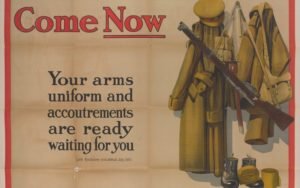 this resulted in a variety of styles, cloth and colours. They were also required to have a pistol not a rifle and carry items including a compass, torch, fob watch, whistle and swagger stick.
this resulted in a variety of styles, cloth and colours. They were also required to have a pistol not a rifle and carry items including a compass, torch, fob watch, whistle and swagger stick.
In October 1914, the 17-year-old Princess Mary launched an appeal to provide every soldier with a Christmas gift. Money collected from donations 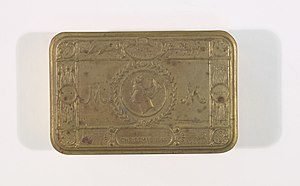 was used to manufacture small boxes made of either brass (for ORs) or silver (for officers) each containing tobacco, cigarettes, a lighter, sweets or chocolate and a Christmas card and photo of the king. Mike has one of these in his collection as well as many, many other treasured and irreplaceable collectables including postcards, china mementos, badges and other items too numerous to mention in detail here.
was used to manufacture small boxes made of either brass (for ORs) or silver (for officers) each containing tobacco, cigarettes, a lighter, sweets or chocolate and a Christmas card and photo of the king. Mike has one of these in his collection as well as many, many other treasured and irreplaceable collectables including postcards, china mementos, badges and other items too numerous to mention in detail here.
Mike’s enthusiasm for all things associated with WW1 is infectious and his collection includes rare and very precious items. His knowledge of this period in our history is second to none and this has recently been acknowledged when he received the BEM for services to First World War heritage and remembrance. 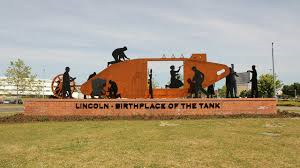 He has successfully campaigned for the restoration and/or erection of War memorials both here and abroad and, he designed the tank memorial on the Tritton Road roundabout in Lincoln. His talk was both informative and instructive and oozed his passion for the subject. He should be congratulated on his wonderful achievements and for allowing us to handle so many pieces from his extensive collection.
He has successfully campaigned for the restoration and/or erection of War memorials both here and abroad and, he designed the tank memorial on the Tritton Road roundabout in Lincoln. His talk was both informative and instructive and oozed his passion for the subject. He should be congratulated on his wonderful achievements and for allowing us to handle so many pieces from his extensive collection.


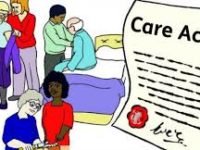

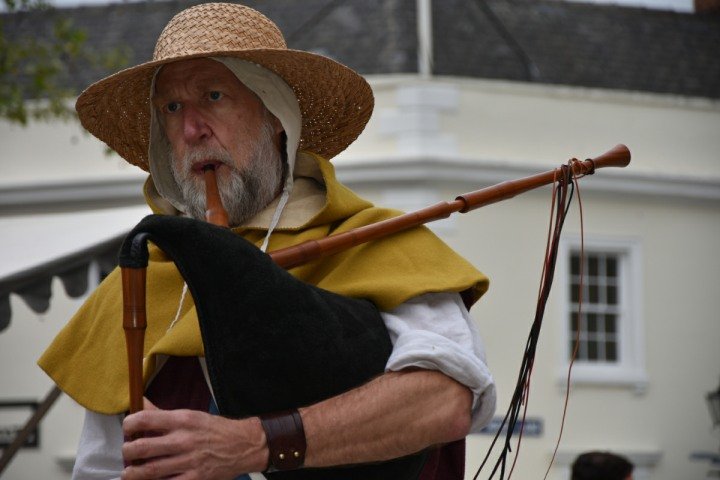
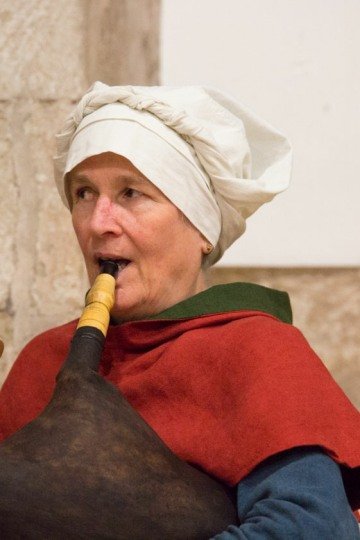
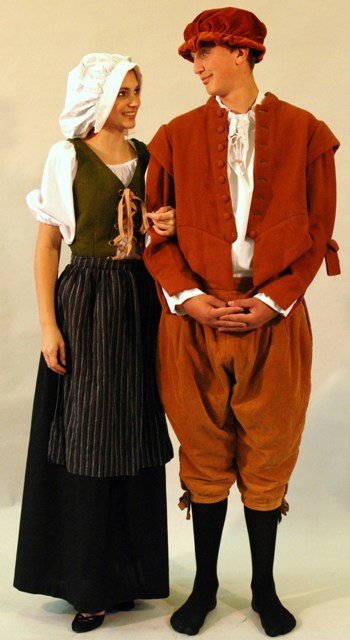



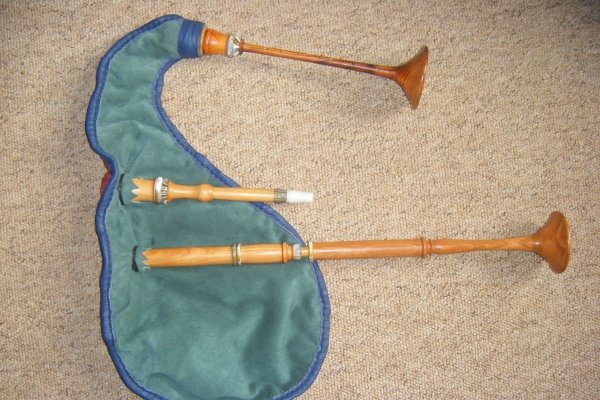














 Have you helped to organise care for an older person?
Have you helped to organise care for an older person? Our Ukulele Band have a number of gigs coming up before Christmas – see below. If you wish to attend any of the public events please contact one of the group members on the
Our Ukulele Band have a number of gigs coming up before Christmas – see below. If you wish to attend any of the public events please contact one of the group members on the 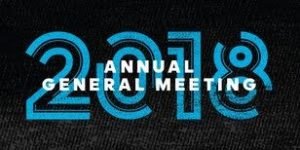 An AGM is ostensibly a formal meeting and, whilst it may not be the most exciting way to spend a morning, it is a constitutional requirement. It was therefore pleasing to note that a fair proportion of the membership had made the effort to attend however, for those of you who presumably couldn’t be bothered, it was your loss because, our Chairman and his committee made a huge effort to ‘spice’ things up for us this year. Whilst the main business on the agenda is a necessary chore, it was undertaken with relative speed and bonhomie so no, it wasn’t boring and tedious but informative and affable.
An AGM is ostensibly a formal meeting and, whilst it may not be the most exciting way to spend a morning, it is a constitutional requirement. It was therefore pleasing to note that a fair proportion of the membership had made the effort to attend however, for those of you who presumably couldn’t be bothered, it was your loss because, our Chairman and his committee made a huge effort to ‘spice’ things up for us this year. Whilst the main business on the agenda is a necessary chore, it was undertaken with relative speed and bonhomie so no, it wasn’t boring and tedious but informative and affable. report which confirmed the accounts are in order and meet all necessary requirements. The members voted to agree to retain our existing object clause and the election of the committee was accepted. Steve singled out a number of members for special praise and presented gifts to the three retiring committee members; and so the official business was concluded swiftly and professionally.
report which confirmed the accounts are in order and meet all necessary requirements. The members voted to agree to retain our existing object clause and the election of the committee was accepted. Steve singled out a number of members for special praise and presented gifts to the three retiring committee members; and so the official business was concluded swiftly and professionally. the obligatory AGM agenda, they organised a communal activity afterwards. This proved to be an excellent way for members to widen their social circle and get the ‘old grey matter’ working as tables of six or less put their heads together to work out a picture puzzle and answer a general knowledge quiz. Unbelievably, three teams recorded identical scores so, to decide the winner, a tie breaking question revealed the victorious table who were each given a gift voucher. This was an extremely novel way to close an AGM and a most enjoyable one so well done everybody.
the obligatory AGM agenda, they organised a communal activity afterwards. This proved to be an excellent way for members to widen their social circle and get the ‘old grey matter’ working as tables of six or less put their heads together to work out a picture puzzle and answer a general knowledge quiz. Unbelievably, three teams recorded identical scores so, to decide the winner, a tie breaking question revealed the victorious table who were each given a gift voucher. This was an extremely novel way to close an AGM and a most enjoyable one so well done everybody.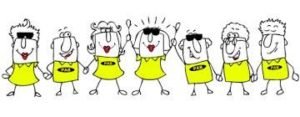


 Michael Credland developed an interest in WW1 from a very early age and, over the years, has built up a formidable collection of artefacts and memorabilia, some of which he had brought along today. He is also a well-respected authority on the role of the Lincolnshire Regiment in the Great War and on war memorials and, has presented his research and expertise in various publications.
Michael Credland developed an interest in WW1 from a very early age and, over the years, has built up a formidable collection of artefacts and memorabilia, some of which he had brought along today. He is also a well-respected authority on the role of the Lincolnshire Regiment in the Great War and on war memorials and, has presented his research and expertise in various publications. literally ‘stuck out like a sore thumb’ however, by the time of The Boer War, keeping out of sight of the long-range rifles necessitated the army trading in its iconic crimson tunics for the much less conspicuous khaki battledress. Between the end of the Boer War and the start of WW1, yet another makeover took place and Mike had three different examples of this ‘new’ uniform on display.
literally ‘stuck out like a sore thumb’ however, by the time of The Boer War, keeping out of sight of the long-range rifles necessitated the army trading in its iconic crimson tunics for the much less conspicuous khaki battledress. Between the end of the Boer War and the start of WW1, yet another makeover took place and Mike had three different examples of this ‘new’ uniform on display. Every soldier carried his load in Patent Webbing which did not quickly deteriorate on the battlefield like leather; it comprised of a wide belt, ammunition pouches (which held 75 rounds each), and a haversack which provided a hands-free means of carrying essential personal items including cutlery, mess tins, clasp knife, razor, can opener and a variety of brushes.
Every soldier carried his load in Patent Webbing which did not quickly deteriorate on the battlefield like leather; it comprised of a wide belt, ammunition pouches (which held 75 rounds each), and a haversack which provided a hands-free means of carrying essential personal items including cutlery, mess tins, clasp knife, razor, can opener and a variety of brushes. British riflemen were renowned for their accuracy; this was put down to the fact that many of them came from farming stock so they were already proficient at shooting. Every soldier was trained to fire a minimum of fifteen rounds per minute using a .303inch calibre Short Magazine Lee-Enfield rifle which had a magazine of 10 rounds. Not only was this rifle very effective in the trenches, it was also far superior to anything used by other countries and, for close quarter fighting, a 17inch Wilkinson Sword bayonet was attached to the end of the rifle; although this did not prevent the rifle from being fired, it did reduce its accuracy.
British riflemen were renowned for their accuracy; this was put down to the fact that many of them came from farming stock so they were already proficient at shooting. Every soldier was trained to fire a minimum of fifteen rounds per minute using a .303inch calibre Short Magazine Lee-Enfield rifle which had a magazine of 10 rounds. Not only was this rifle very effective in the trenches, it was also far superior to anything used by other countries and, for close quarter fighting, a 17inch Wilkinson Sword bayonet was attached to the end of the rifle; although this did not prevent the rifle from being fired, it did reduce its accuracy. this resulted in a variety of styles, cloth and colours. They were also required to have a pistol not a rifle and carry items including a compass, torch, fob watch, whistle and swagger stick.
this resulted in a variety of styles, cloth and colours. They were also required to have a pistol not a rifle and carry items including a compass, torch, fob watch, whistle and swagger stick. was used to manufacture small boxes made of either brass (for ORs) or silver (for officers) each containing tobacco, cigarettes, a lighter, sweets or chocolate and a Christmas card and photo of the king. Mike has one of these in his collection as well as many, many other treasured and irreplaceable collectables including postcards, china mementos, badges and other items too numerous to mention in detail here.
was used to manufacture small boxes made of either brass (for ORs) or silver (for officers) each containing tobacco, cigarettes, a lighter, sweets or chocolate and a Christmas card and photo of the king. Mike has one of these in his collection as well as many, many other treasured and irreplaceable collectables including postcards, china mementos, badges and other items too numerous to mention in detail here. He has successfully campaigned for the restoration and/or erection of War memorials both here and abroad and, he designed the tank memorial on the Tritton Road roundabout in Lincoln. His talk was both informative and instructive and oozed his passion for the subject. He should be congratulated on his wonderful achievements and for allowing us to handle so many pieces from his extensive collection.
He has successfully campaigned for the restoration and/or erection of War memorials both here and abroad and, he designed the tank memorial on the Tritton Road roundabout in Lincoln. His talk was both informative and instructive and oozed his passion for the subject. He should be congratulated on his wonderful achievements and for allowing us to handle so many pieces from his extensive collection.